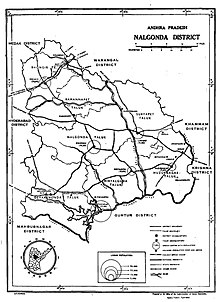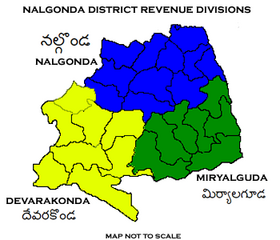District of Telangana in India
| Nalgonda district | |
|---|---|
| District of Telangana | |
 Location in Telangana Location in Telangana | |
| Nalgonda district | |
| Country | India |
| State | Telangana |
| Division | Nalgonda, Miryalaguda, Devarakonda |
| Headquarters | Nalgonda |
| Mandalas | 31 |
| Government | |
| • District collector | Smt. Hari Chandana Dasari (IAS) |
| • Parliamentary constituencies | Nalgonda |
| • Assembly constituencies | 6 assembly seats |
| • Superintendent of Police | G. Chandana Deepthi IPS |
| Area | |
| • Total | 7,122 km (2,750 sq mi) |
| Population | |
| • Total | 1,618,416 |
| • Density | 230/km (590/sq mi) |
| Demographics | |
| • Literacy | 65.05 |
| Time zone | UTC+05:30 (IST) |
| Vehicle registration | TG–05 |
| Major highways | NH-65, NH-561, SH-2 |
| Average annual precipitation | Normal rainfall 751.0 mm; average rainfall 670.2 mm |
| Website | nalgonda |
Nalgonda district is a district in the Telangana state of India. Nalgonda district has the highest number of mandals in the state with 31 mandals. The district shares boundaries with Suryapet, Rangareddy, Yadadri and Nagarkurnool districts and with the state boundary of Andhra Pradesh. In terms of area, Nalgonda is the largest district with an area of 7222.78 km in the state.
Etymology
Nalgonda is derived from two Telugu words Nalla (Black) & Konda (Hills) i.e. Black Hills.
History
Main article: Telangana RebellionNalgonda was earlier referred to as Neelagiri, the name given by some local rulers and the name was changed to Nallagonda only after its conquest by Allauddin Bahaman Shah, the founder of Bahmani Sultanate.
The district had a major role in the Telangana Rebellion.
Geography
The district is spread over an area of 7,122 square kilometres (2,750 sq mi).
Demographics
| Religion in Nalgonda district (2011) | ||||
|---|---|---|---|---|
| Hinduism | 92.70% | |||
| Islam | 5.82% | |||
| Christianity | 1.04% | |||
| Other or not stated | 0.44% | |||
As of 2011 Census of India, Nalgonda district has a population of 1,618,416. Nalgonda has a sex ratio of 978 females per 1000 males and a literacy rate of 63.75%. 181,996 (11.25%) were under 6 years of age. 368,303 (22.76%) lived in urban areas. Scheduled Castes and Scheduled Tribes made up 292,951 (18.10%) and 209,252 (12.93%) of the population respectively.
Languages of Nalgonda district (2011)
Telugu (81.75%) Lambadi (11.91%) Urdu (5.51%) Others (0.83%)According to the 2011 census, 81.75% of the population spoke Telugu, 11.91% Lambadi and 5.51% Urdu as their first language.
The Krishna River, Musi River, Aleru, Peddavagu, Dindi River, Halia River and Paleru flow through the Nalgonda district.
Economy

In 2006 the Indian government named Nalgonda one of the country's 250 poorest districts (out of a total of 640). It is one of the thirty-three districts in Telangana currently receiving funds from the Backward Regions Grant Fund Programme (BRGF).
Agriculture


Nalgonda district is an agrarian district with water resources from the rivers, lakes, canals and ponds. The wells and borewells also support farming in the district. The farmers mainly grow crops such as paddy, and cotton. The climate of the district supports the production of paddy and groundnut seeds.
Geography
Cities
Towns
Villages
Main article: List of villages in Nalgonda districtPower projects
Telangana State Power Generation Corporation Limited (TSGENCO) is building Yadadri Thermal Power Plant in Nalgonda District. The 4000 megawatt thermal project is coming up in a phased manner at Veerlapalem in the district. Bharat Heavy Electricals Limited (BHEL) is appointed as the engineering, procurement, and construction (EPC) contractor for the project.
Notable places in district
- Kurmagiri Narasimha Swamy Temple, Palem (16 Miles) from Nalgonda
- Latif Saheb Hill in Nalgonda
- Sri Chaya Someshwara Temple - 5 km (3.1 mi) from Nalgonda
- Udaya Samudram -6 km (3.7 mi) from Nalgonda
- Cheruvugattu Shivalayam - 14 km (8.6 mi) from Nalgonda
- Devarkonda Fort - 60 km (37 mi) from Nalgonda
- Nagarjuna sagar Dam - 64 km (40 mi) from Nalgonda
Administrative divisions
The district is divided into three revenue divisions: Nalgonda, Miryalaguda, and Devarakonda. These are sub-divided into 31 mandals and has 565 villages. Prashanth Jeevan Patil is the present collector of the district.
Mandals

The below table categorizes the mandals into their respective revenue divisions in the district:
| Sr No. | Nalgonda Division | Miryalaguda Division | Devarakonda Division | Chandur Division |
|---|---|---|---|---|
| 1 | Chityal | Dameracherla | Chandampet | Chandur |
| 2 | Kanagal | Miryalaguda | Chintapally | Munugode |
| 3 | Kattangur | Vemulapally | Devarakonda | Gattuppal |
| 4 | Nakrekal | Anumula Haliya | Gundlapally | Nampally |
| 5 | Nalgonda | Nidamanur | Kondamallapally | Marriguda |
| 6 | Narketpally | Peddavoora | Gudipally | |
| 7 | Shaligowraram | Tripuraram | Neredugommu | |
| 8 | Thipparthy | Madugulapally | Gurrampode | |
| 9 | Kethepalle | Thirumalagiri Sagar | ||
| 10 | Ammanabolu | Adavi Devulapalli |
See also
References
- "Vehicle Registration Codes for New Districts in Telangana".
- "Census GIS India". Censusindiamaps.net. Archived from the original on 3 July 2007. Retrieved 13 June 2012.
- "Nalgonda travel guide". World66.com. Retrieved 13 June 2012.
- TSDPS. "Telangana State Development and planning society" (PDF).
- "Population by Religion - Andhra Pradesh". Census of India. Registrar General and Census Commissioner of India. 2011.
- "Know your district Plan your district - Suryapet" (PDF). trac.telangana.gov.in. Telangana State Remote Sensing Applications Centre.
- ^ "Table C-16 Population by Mother Tongue: Andhra Pradesh". Census of India. Registrar General and Census Commissioner of India.
- "IRRIGATION PROFILE OF NALGONDA DISTRICT". irrigation.telangana.gov.in. Retrieved 18 February 2022.
- ^ Ministry of Panchayati Raj (8 September 2009). "A Note on the Backward Regions Grant Fund Programme" (PDF). National Institute of Rural Development. Archived from the original (PDF) on 5 April 2012. Retrieved 27 September 2011.
- "Agriculture | Nalgonda,Government Of Telangana | India". Retrieved 18 February 2022.
- "Telangana | DISTRICTS OF INDIA". districts.nic.in. Retrieved 25 February 2022.
- Yadadri Thermal Power Plant Project, Telengana, India (nsenergybusiness.com)
- "BHEL's largest Order: Super Critical 20,400 Cr Yadadri TPP – CableCommunity.com". Retrieved 27 February 2022.
- "Cheruvugattu , తెలుగు". wikiedit.org. Retrieved 18 February 2022.
- "New districts". Andhra Jyothy.com. 8 October 2016. Retrieved 8 October 2016.
- "Who's who". 26 February 2020. Retrieved 26 February 2020.
External links
| Places adjacent to Nalgonda district | ||||||||||||||||
|---|---|---|---|---|---|---|---|---|---|---|---|---|---|---|---|---|
| ||||||||||||||||
| Nalgonda district | |
|---|---|
| District Headquarters | |
| Revenue divisions |
|
| Mandals |
|
| Cities | |
| Towns | |
| Census Towns |
|
| |